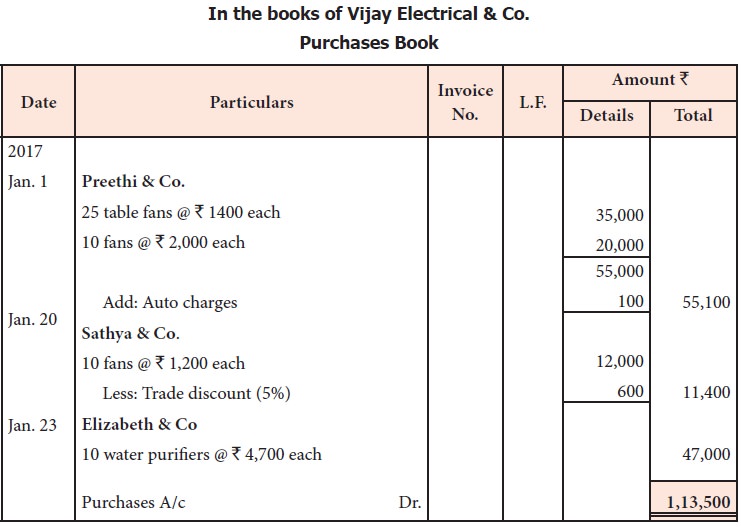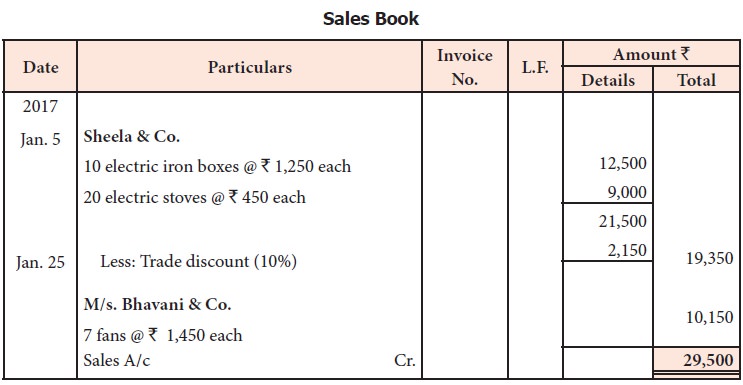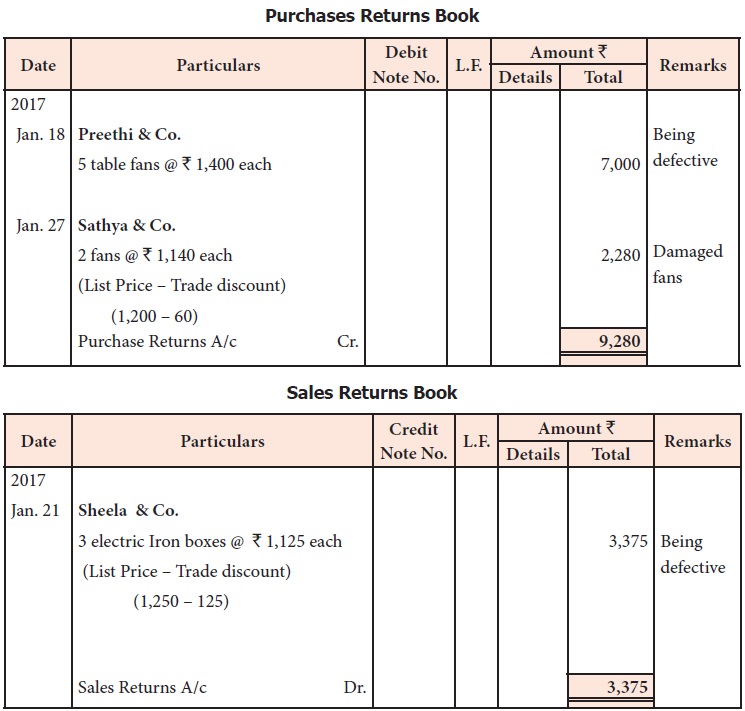Accountancy - Journal proper | 11th Accountancy : Chapter 6 : Subsidiary Books - I
Chapter: 11th Accountancy : Chapter 6 : Subsidiary Books - I
Journal proper
Journal proper
Journal
proper is a residuary book which contains record of transactions, which do not
find a place in the subsidiary books such as cash book, purchases book, sales
book, purchases returns book, sales returns book, bills receivable book and
bills payable book. Thus, journal proper or general journal is a book in which
the residual transactions which cannot be entered in any of the sub divisions
of journal are entered. The usual entries that are passed through this journal
are given below:
i.
Opening journal entry
ii.
Closing journal entry
iii.
Adjusting entries
iv.
Transfer entries
v.
Rectifying entries
vi.
Miscellaneous entries
(i) Opening journal entry
At the end of
the accounting year, all nominal accounts are closed but the business has to be
carried on with previous year’s assets and liabilities. Hence, these accounts
are to be brought into the accounts of the current year. Journal entry made in
the beginning of the current year with the balances of assets and liabilities
of the previous year is opening journal entry. In this entry, asset accounts
are debited, liabilities and capital accounts are credited.
Example
Ramnath carried forward the following items. Make
the opening entry in journal proper as on 1st January, 2017.
Cash 30,000 Stock Rs.
15,000
Furniture Rs. 3,000 Sundry Creditors Rs. 10,000

(ii) Closing journal entry
At the end of
the accounting period, all the ledger accounts relating to purchases, sales,
purchases returns, sales returns, stock and other accounts concerning expenses,
losses, incomes and gains are closed by transfer to trading and profit and loss
account so that financial statements can be prepared. It should be noted that
closing entries are made for nominal accounts only.
Example: Salaries account Rs. 10,000. The closing entry as on 31st December, 2017
is:

iii) Adjusting entries
After
preparing the trial balance, but before preparing the final accounts, if any
adjustment is required in the accounts for items or transactions left out,
adjusting entries are made.
Example
Book value of the machinery as on 1st January, 2017
Rs. 1,00,000. Rate of depreciation is 10% p.a.
Adjusting entry as on 31st December, 2017 is:

(iv) Transfer entries
Transfer
entries are passed in the journal proper for transferring an item entered in
one account to another account. For example, transferring net profit of Rs. 5,000 to capital
account, the following entry is passed:
Transfer Entry

(v) Rectifying entries
Rectifying
entries are passed for rectifying errors which are committed in the books of
accounts. Example
Purchase of furniture by a stationery dealer for Rs. 10,000 was debited to purchases account.
Pass rectifying entry on December 31, 2017.

(vi) Miscellaneous entries
These are
entries which do not occur frequently such as:
·
Credit
purchases and credit sale of assets which cannot be recorded through purchases
or sales book.
·
Endorsement,
renewal and dishonor of bill of exchange which cannot be recorded through bills
book.
·
Other
adjustments like interest on capital, bad debts, reserves, etc.
·
Goods
withdrawn by the owner for personal use.
·
Goods
distributed as samples for sales promotion.
·
Loss of
goods by fire, theft and spoilage.
Illustration 7
Record the
following transactions of Vijay Electrical & Co., in the purchases book,
purchases returns book, sales book and sales returns book.
2017
Jan 1
Purchased on credit from Preethi & Co.,
25 table fans @ Rs. 1,400
each
10 fans @ Rs. 2,000
each
Add: Auto charges @ Rs. 100
Jan 5
Sold on credit to Sheela & co.,
10 electric iron box @ Rs. 1,250 each
20 electric stoves @ Rs. 450 each
Less: 10% Trade discount
Jan 10
Purchased for cash from Brinda & Co.,
10 electric stoves @ Rs. 1,300
each
Jan 18
Returned to Preethi & Co.,
5 table fans being defective for which cash is not
received Jan 20 Purchased from Sathya & Co.,
10 fans @ Rs. 1,200
each
Less: Trade discount 5%
Jan 21
Sheela & Co., returned 3 electric iron boxes as
defective for which cash is not paid
Jan 23
Purchased from Elizabeth & Co., 10 water
purifiers @ Rs. 4,700 each on credit
Jan 25
Sold on credit to M/s. Bhavani & Co., 7 fans @ Rs. 1,450 each
Jan 27
Returned to Sathya & Co., 2 damaged fans for
which cash is not received
Solution



Related Topics